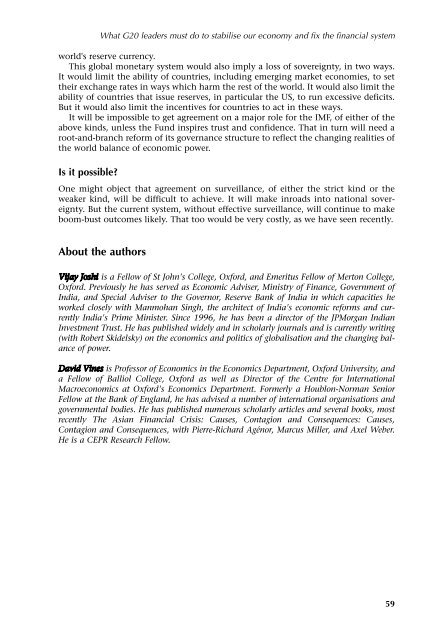What G20 Leaders Must Do To Stabilise our Economy and Fix ... - Vox
What G20 Leaders Must Do To Stabilise our Economy and Fix ... - Vox
What G20 Leaders Must Do To Stabilise our Economy and Fix ... - Vox
Create successful ePaper yourself
Turn your PDF publications into a flip-book with our unique Google optimized e-Paper software.
world's reserve currency.This global monetary system would also imply a loss of sovereignty, in two ways.It would limit the ability of countries, including emerging market economies, to settheir exchange rates in ways which harm the rest of the world. It would also limit theability of countries that issue reserves, in particular the US, to run excessive deficits.But it would also limit the incentives for countries to act in these ways.It will be impossible to get agreement on a major role for the IMF, of either of theabove kinds, unless the Fund inspires trust <strong>and</strong> confidence. That in turn will need aroot-<strong>and</strong>-branch reform of its governance structure to reflect the changing realities ofthe world balance of economic power.Is it possible?<strong>What</strong> <strong>G20</strong> leaders must do to stabilise <strong>our</strong> economy <strong>and</strong> fix the financial systemOne might object that agreement on surveillance, of either the strict kind or theweaker kind, will be difficult to achieve. It will make inroads into national sovereignty.But the current system, without effective surveillance, will continue to makeboom-bust outcomes likely. That too would be very costly, as we have seen recently.About the authorsVijay Joshi is a Fellow of St John's College, Oxford, <strong>and</strong> Emeritus Fellow of Merton College,Oxford. Previously he has served as Economic Adviser, Ministry of Finance, Government ofIndia, <strong>and</strong> Special Adviser to the Governor, Reserve Bank of India in which capacities heworked closely with Manmohan Singh, the architect of India's economic reforms <strong>and</strong> currentlyIndia's Prime Minister. Since 1996, he has been a director of the JPMorgan IndianInvestment Trust. He has published widely <strong>and</strong> in scholarly j<strong>our</strong>nals <strong>and</strong> is currently writing(with Robert Skidelsky) on the economics <strong>and</strong> politics of globalisation <strong>and</strong> the changing balanceof power.David Vines is Professor of Economics in the Economics Department, Oxford University, <strong>and</strong>a Fellow of Balliol College, Oxford as well as Director of the Centre for InternationalMacroeconomics at Oxford's Economics Department. Formerly a Houblon-Norman SeniorFellow at the Bank of Engl<strong>and</strong>, he has advised a number of international organisations <strong>and</strong>governmental bodies. He has published numerous scholarly articles <strong>and</strong> several books, mostrecently The Asian Financial Crisis: Causes, Contagion <strong>and</strong> Consequences: Causes,Contagion <strong>and</strong> Consequences, with Pierre-Richard Agénor, Marcus Miller, <strong>and</strong> Axel Weber.He is a CEPR Research Fellow.59














